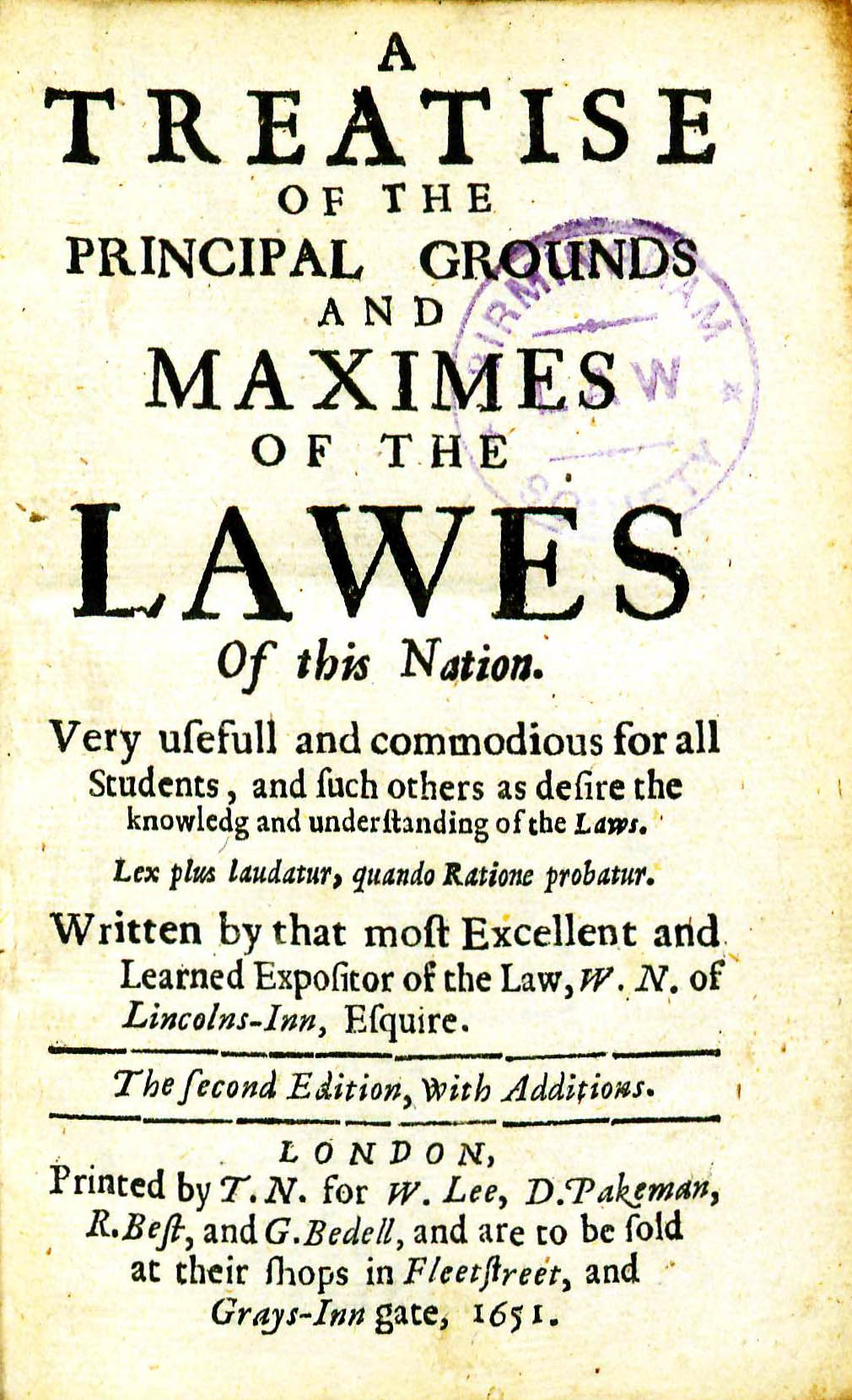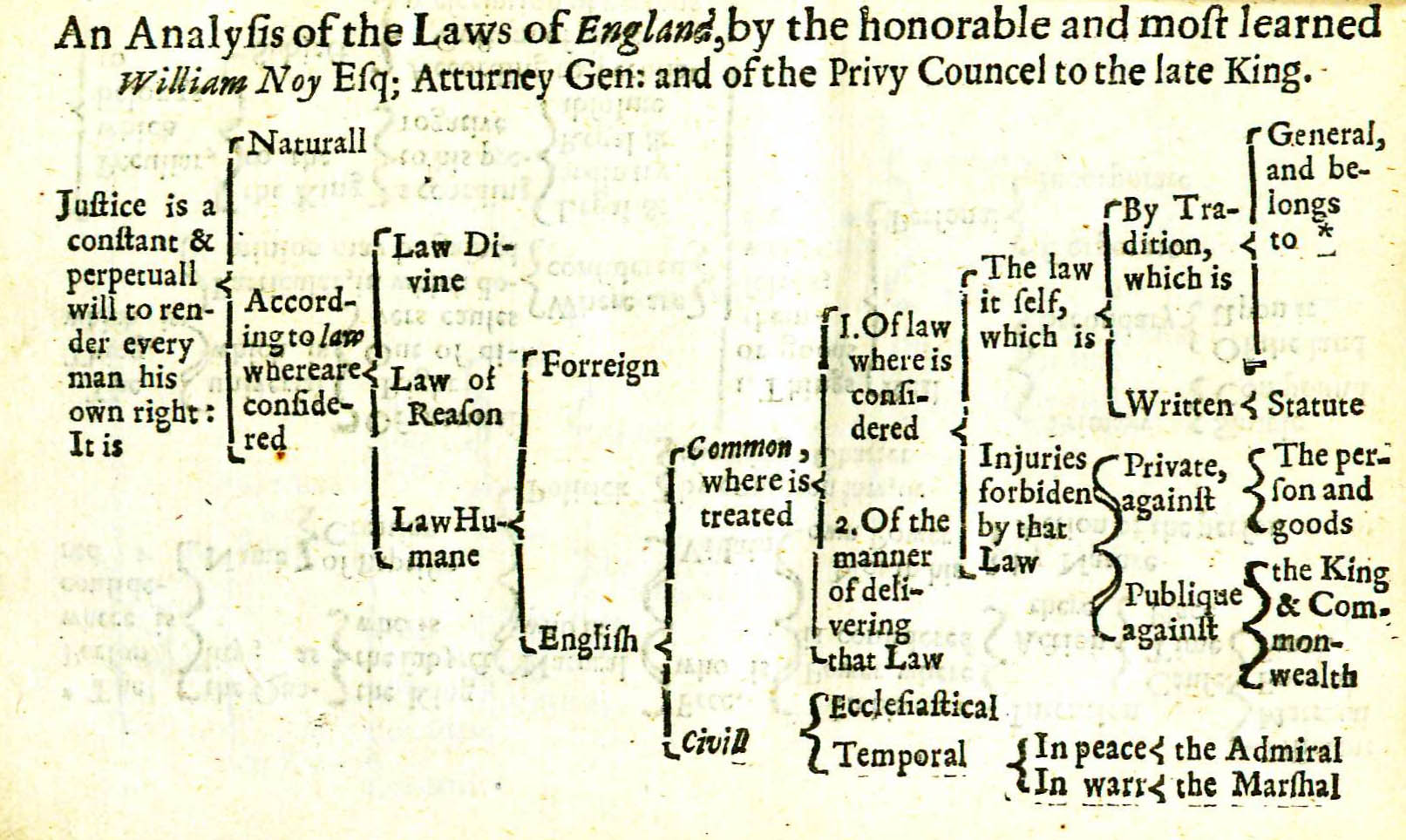A Treatise of the Principal Grounds and Maximes of the Lawes of This Nation
by William Noy
| A Treatise of the Principal Grounds and Maximes of the Lawes | |
|
Title page from A Treatise of the Principal Grounds and Maximes of the Lawes, George Wythe Collection, Wolf Law Library, College of William & Mary. | |
| Author | William Noy |
| Published | London: Printed by T.N. for W. Lee, D. Pakeman, R. Best, and G. Bedell |
| Date | 1651 |
| Edition | Second, with additions |
| Pages | 159 |
| Desc. | 8vo (15 cm.) |
| Location | Shelf F-4 |
William Noy (1577 – 1634) was an English barrister who was appointed by Sir Francis Bacon to be an official recorder for the courts of common law. During this time, Noy joined others in an attempt to review English statutory law. In 1621 Noy became a leading figure in Parliament, and from 1631-1634 he served as attorney general.[1] His death in 1634 was received with mixed feelings; while many colleagues held him in high regard, others were offended by his surly and discourteous personality.[2] "Perhaps his greatest legacy was the learning he passed on to the subsequent generation of lawyers. Among his pupils were Sir Orlando Bridgman, Sir John Maynard, and most notably, Sir Matthew Hale."[3]
A Treatise of the Principal Grounds and Maximes of the Lawes of this Nation, first published in 1641, was originally written in French and "translated by a person who was neither well acquainted with the language of the work, nor understood the subjects of which it treated. The defective translation continued to be reprinted until [W. M.] Blythewood's edition" in 1817.[4] Noy "was a profound laywer, and his maxims and observations, notwithstanding the disadvantages under which they labored, have always been regarded as 'a collection of reputation and authority.'"[5]
Evidence for Inclusion in Wythe's Library
Brown's Bibliography[6] includes the fourth (1667) edition of Noy's Treatise of the Principle Grounds and Maximes of the Lawes based on quotations in the manuscript copy of John Marshall's law notes. Dean's memo[7] lists the 1641 edition, following a reference in Alan Smith's dissertation "Virginia Lawyers, 1680-1776: The Birth of an American Profession" which cites Thomas Jefferson's commonplace book.[8] Copies of the editions recommended by Brown and Dean proved difficult to locate. Because the evidence for those specific editions is inconclusive, the Wolf Law Library purchased an available copy of the second (1651) edition.
Description of the Wolf Law Library's copy
Bound in period style full calf with blind rules. Title page bears the stamp of the Birmingham Law Society library. Purchased from Meyer Boswell Books.
Images of the library's copy of this book are available on Flickr. View the record for this book in William & Mary's online catalog.
Full text
See also
References
- ↑ James S. Hart Jr, "Noy , William (1577–1634)" in Oxford Dictionary of National Biography, accessed October 9, 2013.
- ↑ Ibid.
- ↑ Ibid.
- ↑ J. G. Marvin, Legal Bibliography or a Thesaurus of American, English, Irish, and Scotch Law Books (Philadelphia: T. & J. W. Johnson, Law Booksellers, 1847), 542-543.
- ↑ Ibid, 543.
- ↑ Bennie Brown, "The Library of George Wythe of Williamsburg and Richmond," (unpublished manuscript, May, 2012) Microsoft Word file. Earlier edition available at: https://digitalarchive.wm.edu/handle/10288/13433.
- ↑ Memorandum from Barbara C. Dean, Colonial Williamsburg Found., to Mrs. Stiverson, Colonial Williamsburg Found. (June 16, 1975), 13 (on file at Wolf Law Library, College of William & Mary).
- ↑ Alan McKinley Smith, "Virginia Lawyers, 1680-1776: The Birth of an American Profession" (PhD diss., The Johns Hopkins University, 1967), 263.

